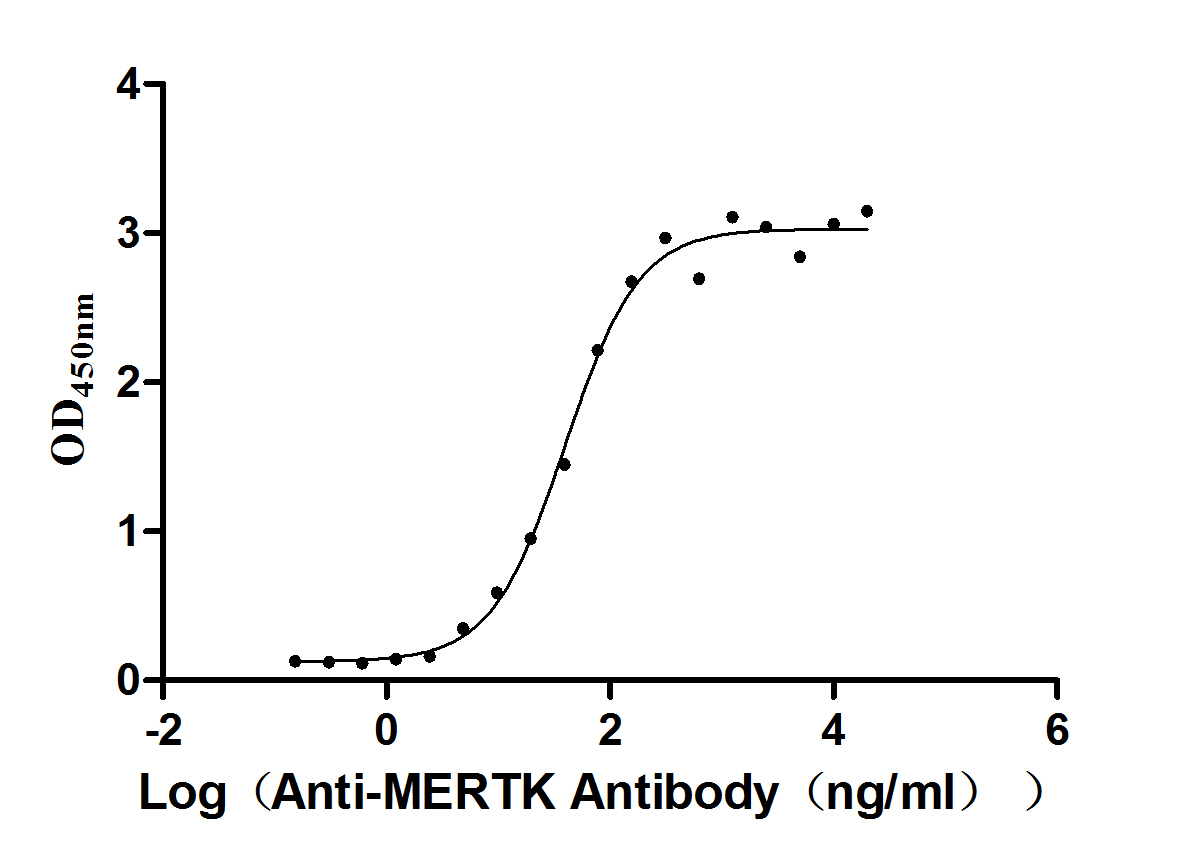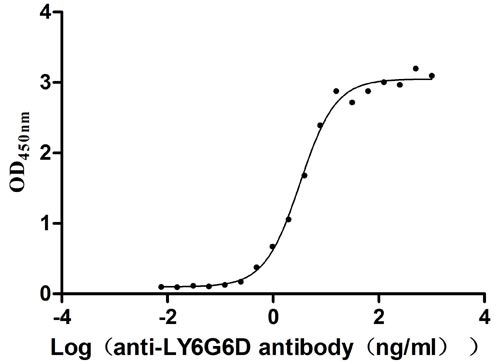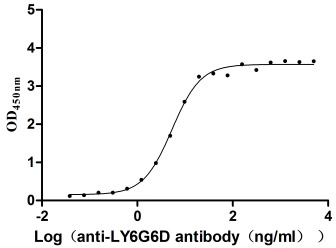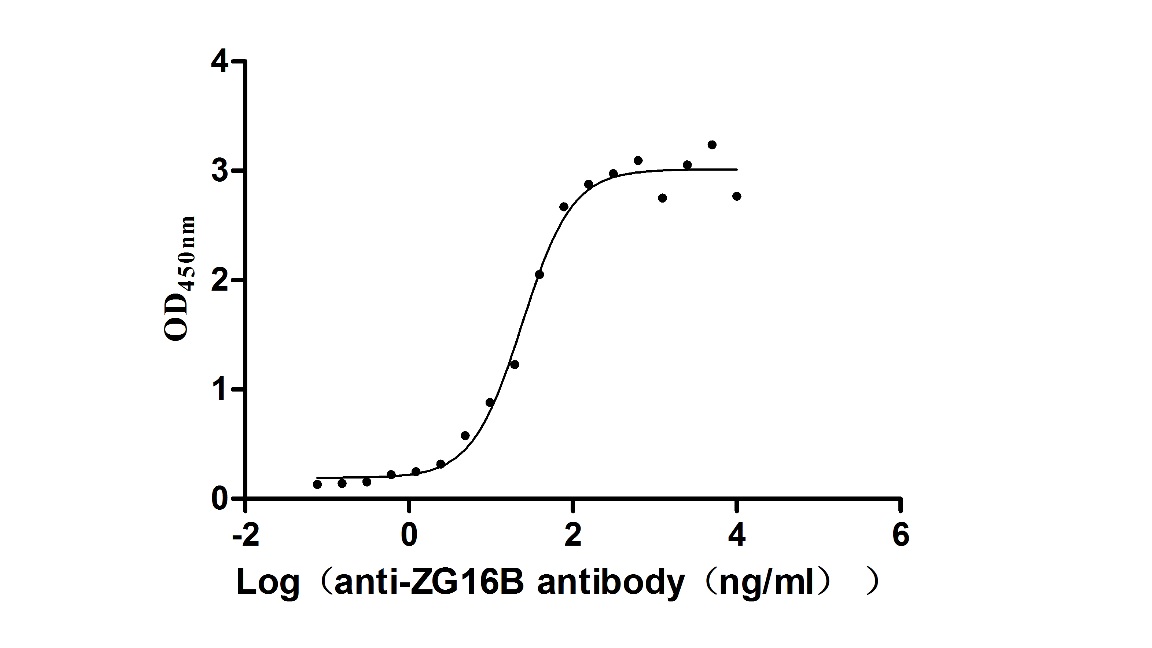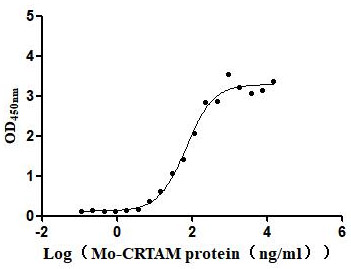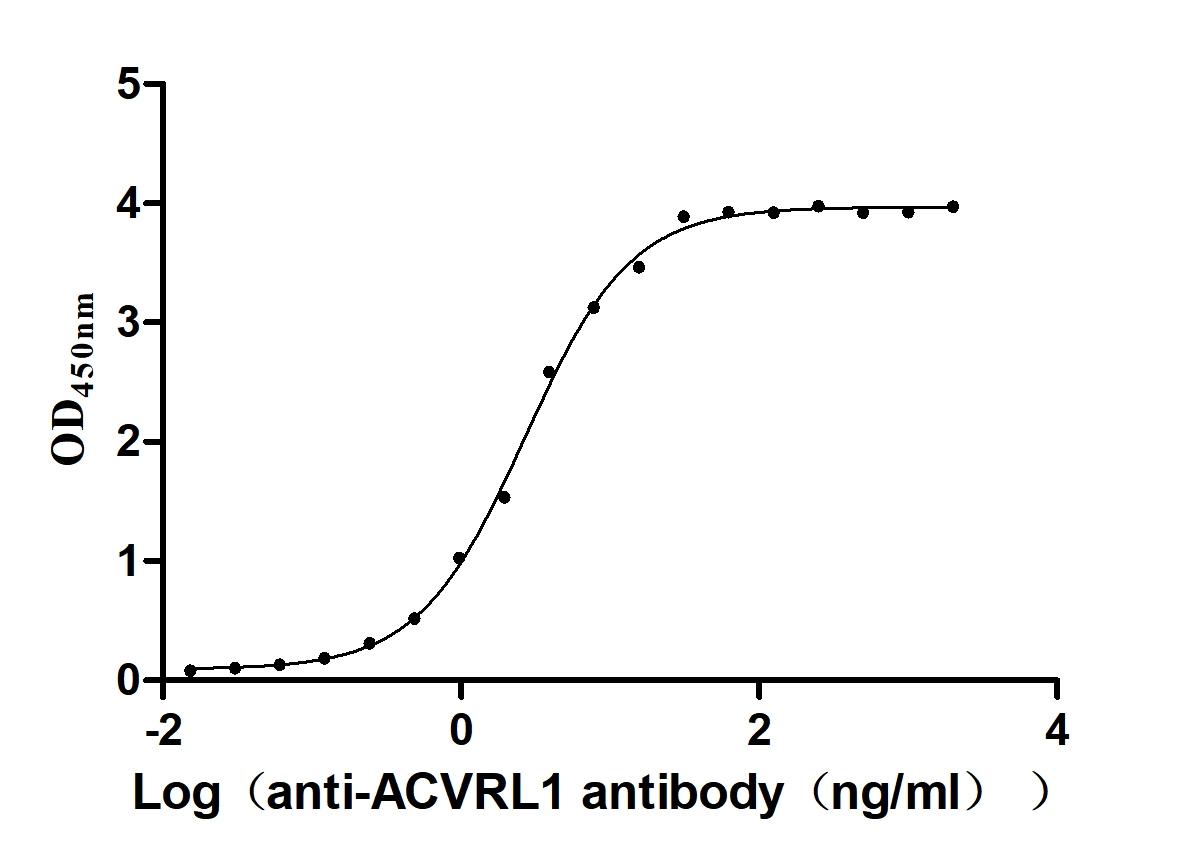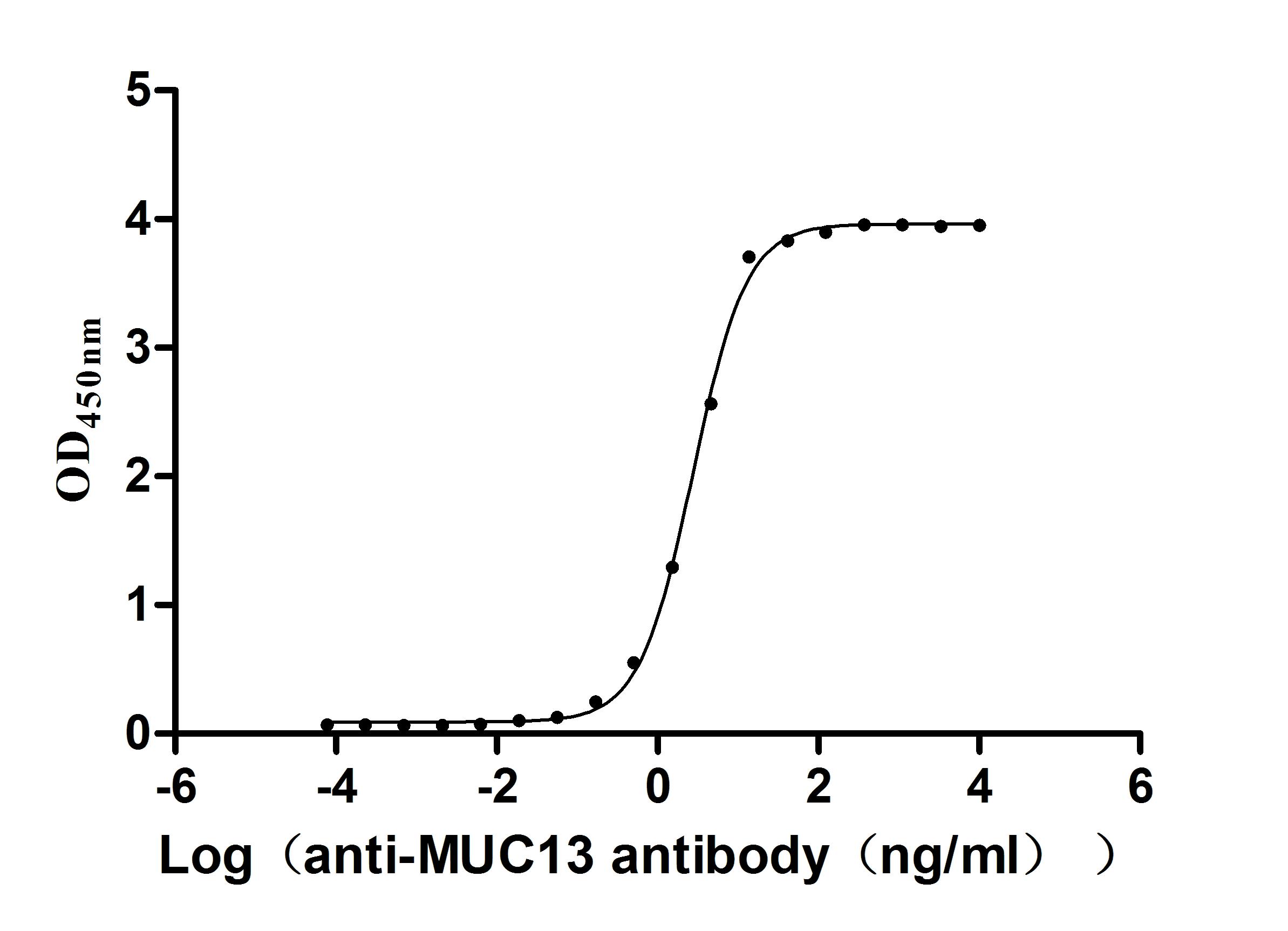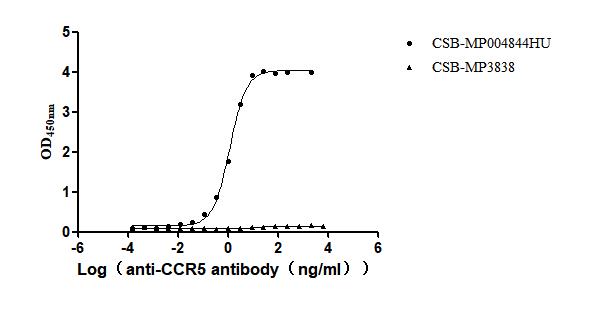Recombinant Mouse VIP peptides (Vip)
-
货号:CSB-YP025858MO
-
规格:
-
来源:Yeast
-
其他:
-
货号:CSB-EP025858MO
-
规格:
-
来源:E.coli
-
其他:
-
货号:CSB-EP025858MO-B
-
规格:
-
来源:E.coli
-
共轭:Avi-tag Biotinylated
E. coli biotin ligase (BirA) is highly specific in covalently attaching biotin to the 15 amino acid AviTag peptide. This recombinant protein was biotinylated in vivo by AviTag-BirA technology, which method is BriA catalyzes amide linkage between the biotin and the specific lysine of the AviTag.
-
其他:
-
货号:CSB-BP025858MO
-
规格:
-
来源:Baculovirus
-
其他:
-
货号:CSB-MP025858MO
-
规格:
-
来源:Mammalian cell
-
其他:
产品详情
-
纯度:>85% (SDS-PAGE)
-
基因名:Vip
-
Uniprot No.:
-
别名:Vip; VIP peptides [Cleaved into: Intestinal peptide PHI-42; Intestinal peptide PHI-27; Peptide histidine isoleucinamide 27); Vasoactive intestinal peptide; VIP; Vasoactive intestinal polypeptide)]
-
种属:Mus musculus (Mouse)
-
蛋白长度:Cytoplasmic domain
-
表达区域:80-155
-
氨基酸序列RHADGVFTSDYSRLLGQISAKKYLESLIGKRISSSISEDPVPIKRHSDAVFTDNYTRLRKQMAVKKYLNSILNGKR
-
蛋白标签:Tag type will be determined during the manufacturing process.
The tag type will be determined during production process. If you have specified tag type, please tell us and we will develop the specified tag preferentially. -
产品提供形式:Lyophilized powder
Note: We will preferentially ship the format that we have in stock, however, if you have any special requirement for the format, please remark your requirement when placing the order, we will prepare according to your demand. -
复溶:We recommend that this vial be briefly centrifuged prior to opening to bring the contents to the bottom. Please reconstitute protein in deionized sterile water to a concentration of 0.1-1.0 mg/mL.We recommend to add 5-50% of glycerol (final concentration) and aliquot for long-term storage at -20℃/-80℃. Our default final concentration of glycerol is 50%. Customers could use it as reference.
-
储存条件:Store at -20°C/-80°C upon receipt, aliquoting is necessary for mutiple use. Avoid repeated freeze-thaw cycles.
-
保质期:The shelf life is related to many factors, storage state, buffer ingredients, storage temperature and the stability of the protein itself.
Generally, the shelf life of liquid form is 6 months at -20°C/-80°C. The shelf life of lyophilized form is 12 months at -20°C/-80°C. -
货期:Delivery time may differ from different purchasing way or location, please kindly consult your local distributors for specific delivery time.Note: All of our proteins are default shipped with normal blue ice packs, if you request to ship with dry ice, please communicate with us in advance and extra fees will be charged.
-
注意事项:Repeated freezing and thawing is not recommended. Store working aliquots at 4°C for up to one week.
-
Datasheet :Please contact us to get it.
相关产品
靶点详情
-
功能:VIP causes vasodilation, lowers arterial blood pressure, stimulates myocardial contractility, increases glycogenolysis and relaxes the smooth muscle of trachea, stomach and gall bladder.; PHM-27 is a potent agonist of the calcitonin receptor CALCR, with similar efficacy as calcitonin. PHM also causes vasodilation.
-
基因功能参考文献:
- A significant myenteric neuronal cell loss and upregulation of VIP expression were found after focal, but not global, cerebral ischaemia. PMID: 29577471
- Martinotti cells in layers II/III of the mouse primary somatosensory cortex are inhibited by both parvalbumin (PV)- and vasoactive intestinal polypeptide (VIP)-expressing cells. PMID: 27897179
- BAD phosphorylation is essential in the cytoprotective effect of vasoactive intestinal peptide on cancer stem cells. PMID: 28569785
- The suprachiasmatic nucleus (SCN)network consists of multiple clusters of cellular circadian rhythms that are differentially integrated by AVP and VIP signaling, depending on the postnatal period PMID: 27626074
- PACAP/PAC1 signaling is important for light regulated behavior, VIP/VPAC2 signaling for stable clock function and both signaling pathways may play a role in shaping diurnality versus nocturnality. PMID: 29155851
- The data of this study support a key role for VIP interneurons in cortical circuit development and suggest a possible contribution to pathophysiology in neurodevelopmental disorders PMID: 28817803
- During arousal, VIP cells rapidly and directly inhibit pyramidal neurons; VIP cells also indirectly excite these pyramidal neurons via parallel disinhibition. PMID: 28114295
- This study found that VIP-/- mice show a bilateral tactile hypersensitivity after spared nerve injury and a bilateral increase in neuronal activation upon innocuous tactile paw stimulation. PMID: 28359740
- we found that VIP inhibits NFAT nuclear translocation in primary human pulmonary artery smooth muscle cells (PASMC). Early activation of NFATc3 in IPF patients may contribute to disease progression and the increase in VIP expression could be a protective compensatory mechanism PMID: 28125639
- Several studies have shown that VIP(+) cells are sensitive to neuromodulation and increase their firing during locomotion, whisking, and pupil dilation and are involved in spatially specific top-down modulation, reminiscent of the effects of top-down attention, and also that attention enhances spatial resolution. Our findings provide a bridge between these studies by establishing the inhibitory circuitry that regulates th PMID: 27911754
- majority of GnRH neurons in male and female mice express functional VIP receptors; effects of VIP on GnRH neurons do not alter across the estrous cycle PMID: 27501185
- Backup mechanisms maintain PACAP/VIP-induced arterial vasodilation in PACAP-deficient mice. PMID: 28490016
- in cortical VIP neurons, experience-dependent gene transcription regulates visual acuity by activating the expression of IGF1, thus promoting the inhibition of disinhibitory neurons and affecting inhibition onto cortical pyramidal neurons PMID: 26958833
- Chronic loss of VIP in mice leads to a disruption of certain but not all immunological compartments. PMID: 25301381
- neuropeptides CGRP and VIP have an important role in suppressing bone resorptive activities through RANKL/OPG pathway, similar to mechanical loading. PMID: 24717410
- The results show in vivo a primary role for VIP chronic exposure in CFTR membrane stability and function and confirm in vitro data. PMID: 24898584
- VIP signaling modulates the output from the olfactory bulb to maintain circadian rhythms in the mammalian olfactory system. PMID: 24760863
- VIP neuropeptide-mediated cAMP-PKA signaling has an important role in hepatic homeostasis and cytoprotection in vivo PMID: 23744729
- Loss of the VIP gene orchestrates a panoply of pathogenic genes which are detrimental to both left and right cardiac homeostasis. PMID: 23700405
- Vasoactive intestinal peptide may be an essential factor for Hertwig's epithelial root sheath development. PMID: 22925217
- With cyclophosphamide-induced cystitis,VIP transcript expression significantly increased in the urothelium (48 h) of NGF-OE mice. PMID: 22700375
- Peritoneal cells isolated from VIP KO naive mice produced lower levels of proinflammatory cytokines in response to LPS in vitro. PMID: 22615845
- The data indicate that the intact circadian system can compensate for some of the consequences of the loss of VIP, whereas this peptide is indispensable for endogenous encoding of seasonal information. PMID: 22512278
- Stimulation with VIP significantly increased cyclic AMP formation in colon preparations from control but not DSS-treated mice. PMID: 21939768
- Data suggest that the Vip gene is not required for induction of a gene expression program linked to small bowel growth after enhancement of GLP-2 receptor signaling. PMID: 22535770
- VIP increased the presence of immunoregulatory cytokines. VIP also modulates Th2/Th9 and iTreg/Th1 ratios. PMID: 21445087
- PACAP and VIP are endogenous mediators that likely regulate immunity and immune-mediated diseases within the skin. PMID: 22531916
- These data support the concept that VIP influences the endogenous oxidant/antioxidant balance. One potential implication is that VIP and its analogues may be used to treat inflammatory diseases, including asthma. PMID: 22103391
- VIP and pituitary adenylate cyclase-activating polypeptide 38 (PACAP-38), but not secretin, stimulated rankl mRNA expression in mouse calvarial osteoblasts. VIP inhibited mRNA expressions of opg and m-csf, effects shared by PACAP-38, but not by secretin PMID: 21815197
- results support that decline in VIP/VPAC local levels may influence survival/apoptosis intracellular set point in NOD acinar cells and their clearance, contributing to gland homeostasis loss in a model of Sjogren's syndrome PMID: 22059987
- The reduced birth rate at 16-week-old NOD mice with a Th1 systemic cytokine profile involves resorption processes with a lower expression of VIP at the sites of implantation, which acts as a local inducer of pro-implantatory LIF and Treg activation. PMID: 19633131
- VIP blockade induces microcephaly through Mcph1 signaling; VIP/Mcph1/Chk1 signaling is key for normal cortical development PMID: 21737879
- absence of this peptide alters both the amplitude of circadian rhythms as well as the phase relationships between the rhythms in the suprachiasmatic nucleus and periphery PMID: 21628547
- Antigen-specific primary and secondary immune responses are accelerated in VIP-deficient (KO) mice and in mice reconstituted with VIP-KO hematopoietic cells, supporting the role of VIP in immune counter-regulatory pathways. PMID: 21677142
- the VIP/VPAC2 system induces reactive astrocytosis and plays a key role in neuroprotection against excitotoxicity in neurological disorders PMID: 21281617
- VIP enhancement of the severity of dextran sodium sulfate-induced colitis is mediated solely by VPAC1 receptors in mice. PMID: 21295288
- The results suggest that VIP has a role in the neural control of pelvic organ function and activation of VPAC and/or PACAP receptors can modulate the activity of the autonomic neurons innervating pelvic organs. PMID: 20428965
- Data describe PACAP, vasoactive intestinal polypeptide, and PAC1, VPAC1, VPAC2 transcripts or protein expression in urothelium and detrusor smooth muscle and lumbosacral dorsal root ganglia in NGF-overexpressing and wildtype mice. PMID: 20449688
- VIP provides significant protection against spontaneous diabetes by modulating T-cell subsets and counterbalancing tolerance and immunity. PMID: 20309012
- PACAP/VIP as well as their three classes of receptors are important in many physiological/pathophysiological processes, some of which are identified in these studies using knockout animals. PMID: 21157320
- These results demonstrate that VIP is an important regulator of physiological circadian rhythmicity in the heart. PMID: 20952671
- The study provides new insights into the local regulation of VIP in the columnar epithelia of the allergic lung. PMID: 20566347
- VIP plays an unanticipated permissive and/or proinflammatory role in the propagation of the inflammatory response in the CNS PMID: 20978211
- VIP and PACAP regulate the responsiveness of cells within the suprachiasmatic nucleus to the effects of light PMID: 20180841
- VIP knockout mice demonstrate elevated plasma glucose, insulin, and leptin levels, with no islet beta-cell number/topography alteration. PMID: 20150284
- These results confirm that TH2, but not TH1 cells, express and secrete functional VIP following specific antigen stimulation. PMID: 11935374
- VIP and PACAP have an anti-inflammatory role by a new mechanism associated with impairment of a key component of the chemokine network PMID: 12090758
- There was a deficient VIP-activated signaling associated with a reduced saliva and amylase secretion in response to VIP, suggesting impaired balance of neuroimmune interactions in reduced salivary secretion of NOD mice. PMID: 12225893
- VIP/PACAP interference with the p65/CBP interaction in activated microglia may represent a significant element in the regulation of the inflammatory response in the CNS by the endogenous neuropeptides PMID: 12372411
- This peptide regulates nerve growth factor in the embryonic mouse. PMID: 12383868
显示更多
收起更多
-
亚细胞定位:Secreted.
-
蛋白家族:Glucagon family
-
数据库链接:
KEGG: mmu:22353
STRING: 10090.ENSMUSP00000019906
UniGene: Mm.98916
Most popular with customers
-
Recombinant Human Tyrosine-protein kinase Mer (MERTK), partial (Active)
Express system: Mammalian cell
Species: Homo sapiens (Human)
-
Recombinant Human Lymphocyte antigen 6 complex locus protein G6d (LY6G6D) (Active)
Express system: Yeast
Species: Homo sapiens (Human)
-
Recombinant Macaca fascicularis lymphocyte antigen 6 family member G6D (LY6G6D) (Active)
Express system: Yeast
Species: Macaca fascicularis (Crab-eating macaque) (Cynomolgus monkey)
-
Recombinant Macaca fascicularis zymogen granule protein 16 homolog B (ZG16B) (Active)
Express system: Mammalian cell
Species: Macaca fascicularis (Crab-eating macaque) (Cynomolgus monkey)
-
Recombinant Mouse Cell adhesion molecule 1 (Cadm1), partial (Active)
Express system: Mammalian cell
Species: Mus musculus (Mouse)
-
Recombinant Human Serine/threonine-protein kinase receptor R3 (ACVRL1), partial (Active)
Express system: Baculovirus
Species: Homo sapiens (Human)
-
Recombinant Human Mucin-13(MUC13),partial (Active)
Express system: yeast
Species: Homo sapiens (Human)
-
Recombinant Human C-C chemokine receptor type 5 (CCR5)-VLPs (Active)
Express system: Mammalian cell
Species: Homo sapiens (Human)


